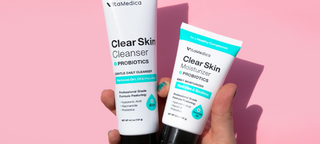Using probiotics to combat acne and other inflammatory skin conditions is a recent treatment trend. But, while we know that taking a probiotic supplement can be effective, what about putting it directly on the skin?
Good news - recent discoveries are making that option look ever more promising.
The latest study showed that application of a topical lotion formulated with beneficial bacteria protected against skin infections by destroying harmful bacteria on the skin.
Scientists found that people with healthy skin have many bacteria producing antimicrobial peptides that selectively act against pathogenic bacteria but don’t harm beneficial bacteria.
However, those with skin conditions like atopic dermatitis, or eczema, have the “wrong” type of bacteria and are more prone to bacteria like Staphylococcus aureus (or S. aureus) which can become methicillin-resistant Staphylococcus aureus, or MRSA.
By isolating the good bacteria and growing it, they were able to effectively “transplant” it back to those who were deficient in the form of a skin cream; all patients treated this way saw a significant decrease in S. aureus on their skin.
Bacterial Strains Linked to Acne
While people with skin disorders will need to continue applying the topical probiotics because their bodies do not naturally promote the growth of these beneficial bacteria, thankfully, the treatment is easy.
With more research, we find more evidence that the microbiome plays a major role in our health, immunity, and corresponding susceptibility to disease.
And although we tend to associate gut microbes with healthy digestion and vitamin synthesis, these bacteria play an important role in immune health. While the skin – our first line of defense against pathogens and infection – seems distant from our gut, there’s no denying our gut microbes influence our skin health.
We already know that beneficial gut bacteria reduce the severity of acne. And the evidence that gut microbiota and oral probiotics influence systemic inflammation, oxidative stress, glycemic control, tissue lipid content, and even mood itself, may have important implications in acne. Is it any surprise that by balancing the bacteria on the skin, skin infections can improve?
Fight Acne & Inflammation by Doing This
Why Probiotics are Good for Acne
Traditional treatments use antibiotics, which not only kill bad bacteria but also kill the beneficial microbes that we’re now learning can help our skin. So, in the case of diseases with an imbalance in microorganisms such as impure skin, mild acne, dry skin, or mild atopic dermatitis, topical probiotics present an effective alternative to strictly antibacterial products.
Knowing this, what are the best probiotic treatment options to promote a healthy balance of bacteria on your skin and prevent flare-ups and breakouts?
Take a Probiotic Supplement
A broad-spectrum oral probiotic like Probiotic-8, which includes 8 billion live colony-forming units (CFUs) of 8 strains of beneficial bacteria, as well as prebiotic fiber to “feed” good bacteria, can help promote a healthy balance of gut bacteria. A special enteric coating shields bacteria from stomach-acid and delivers microflora directly to the intestine to help repopulate the digestive tract with the beneficial bacteria you need.
Probiotics and Acne Control – What You Need to Know
Lactoferrin Supplementation Significantly Improves Acne
Use a Topical Probiotic
Clear Skin Probiotic Facial Cleanser and Clear Skin Probiotic Facial Moisturizer are a physician formulated line of probiotic-based topicals that address dry, irritated, acne-prone skin by using soothing ingredients for a naturally radiant, healthy, and blemish-free complexion.
Clear Skin Probiotic Facial Cleanser is a water-based foaming gel cleanser features a powerhouse combination of key ingredients, including Hyaluronic Acid, Niacinamide, Probiotics, and Aloe. Ideal for daily use, our cleanser gently removes dirt, oil, and impurities, without the risk of over-drying. The formula goes beyond cleansing, actively hydrating and soothing dry, irritated skin while supporting a healthy skin barrier. Enriched with probiotics, this cleanser not only helps maintain a balanced skin microbiome but also provides protection against future breakouts. With added benefits such as diminishing the appearance of large pores, brightening the skin, and promoting an even texture.
Clear Skin Facial Probiotics Moisturizer combines the hydrating power of Hyaluronic Acid and Squalane with Vitamin E and Probiotics to protect and balance the skin. This water-based moisturizer is a lightweight, fast-absorbing formula that calms your skin and leaves it nourished without any greasy residue. By supporting and strengthening your skin’s natural barrier, it maintains optimal pH levels for a balanced and radiant complexion.
Eat Probiotic-Containing Foods
Consuming foods rich in probiotics can directly add back beneficial bacteria to your gut. Foods like sauerkraut, pickles, kimchi, and miso all have probiotic benefits, but kefir and yogurt (non-fat, without added sugars) are the best options.
Get More Fiber in Your Diet
Fiber promotes the development of good bacteria; if you eat more foods containing fiber like fruits, vegetables, whole grains, nuts, and seeds, it means you’ll be eating less processed, sugary foods which “feed” and promote the development of bad bacteria that can exacerbate inflammatory skin conditions like acne as well as other health concerns like weight gain and blood sugar.
Cutting Empty Carbs and Dairy Key for Clear Skin
The benefits of probiotics go far beyond the digestive tract – they can help with issues like skin health, weight control, and mood, among others that are yet-to-be-discovered.
Turns out looking healthy, feeling healthy, and being healthy is all about reaching the right balance – of bacteria, that is.


